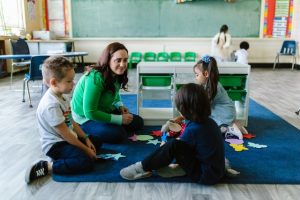
Homeschooling: A Curious Adventure for Kids or a Road Less Traveled for a Reason?
Homeschooling! Oh, the images it conjures. Fluffy couches serve as classrooms, tree branches doubling as arithmetic tools, and where every moment can become a ‘teachable’ moment. But beyond these poetic illusions lies the real, pressing question: Is homeschooling genuinely good for kids? Also, can you do online school and still play sports?
Let’s Talk Pros
Flexibility Rules: With no ringing bells or rushing for buses, homeschooling oozes flexibility. Kids can learn at their pace, which can be a breath of fresh air for those who either gallop like a horse or stroll like a Sunday morning.
Bespoke Learning: Tailored jackets are fancy, but tailored curriculums? Now, that’s luxurious. Homeschooling allows parents to craft lessons suited to their child’s style. If Jane loves galaxies and stars, why not start algebra with a touch of astronomy?
Life Skills Aplenty: Ever felt schools missed teaching some real-world skills? With homeschooling, daily chores can become math problems, budgeting exercises, or even biology lessons (hello, fermentation during bread making!).
Closer Bonds: Spending ample time together, families often report stronger ties. These bonds aren’t just limited to parent-child but often extend to siblings.

A Glimpse at the Cons
The Social Question: The most significant argument against homeschooling is the socialization aspect. Without a classroom filled with peers, do kids miss out on those crucial interpersonal skills?
The Overwhelm: Being the teacher, principal, cafeteria manager, and janitor can be overwhelming for parents. And sometimes, this can translate into stress for the kids too.
Potential Biases: Even with the best intentions, parents may impart certain biases, whether cultural, religious, or personal. This could potentially limit the child’s worldview.
Resource Limitations: No matter how resourceful one might be, homeschooling can’t always replicate the vast resources – both material and human – that schools offer.
Reality Check
Different Strokes for Different Folks: While Jake might flourish learning geometry surrounded by trees, Sarah might miss her school’s bustling energy. Every child is different, and homeschooling might work wonders for one and be a misadventure for another.
The Digital Age Rescue: The digital world has revolutionized homeschooling. Online resources, forums, and courses have blurred the lines, making homeschooling a more feasible option for many.
Community Over Isolation: Modern homeschoolers aren’t isolated. With homeschooling groups, community classes, and organized field trips, many homeschooled kids find themselves as socially engaged as their traditionally schooled counterparts.
The Financial Factor
Homeschooling does come with financial implications. With at least one parent often choosing to stay home, it can strain some budgets. But on the flip side, think of the savings: no school uniforms, fewer school trips, and no packed lunches.
The Learning Curve for Parents
It’s not just the kids who are learning. Parents, too, undergo a massive learning curve. From understanding curriculums to mastering teaching techniques, it’s a constant journey. Plus, navigating the emotional dynamics is a lesson in itself.
- A Note on Special Needs
For kids with special needs, homeschooling can be a sanctuary. Personalized lessons, flexible schedules, and a comfortable environment can make learning more accessible and enjoyable. However, it’s crucial to ensure they still receive any specialized support they might need, be it speech therapy, occupational therapy, or any other support service.
- The Peer Pressure Paradigm
The dynamics of peer pressure in traditional schools are multifaceted. For some children, this pressure moulds their character, teaching them resilience and adaptability. On the other hand, others may find it stifling, leading to diminished self-worth or, even worse, mental health challenges. Homeschooling eliminates the conventional peer pressure environment, allowing kids to grow in spaces free from stereotypical expectations. However, this also means missing out on those quintessential school experiences – the good, the bad, and the in-between.
- The Creative Canvas
One often uncharted territory of homeschooling is the vast canvas it provides for creativity. Without stringent schedules and standard curriculum boundaries, children can explore topics beyond textbooks. A history lesson might not just be dates and events; it could be a deep dive into cultural dances of that era or even culinary explorations. This immersive learning not only instils a genuine love for subjects but also fosters lateral thinking and innovation. But it also begs the question: with so much freedom, do kids miss out on the discipline and structure that schools provide?
- A Dance with Discipline
While creativity blooms in the homeschooling arena, discipline often takes a different form. Instead of external regulations, the onus of discipline shifts inwards. Children learn the value of self-regulation, time management, and personal responsibility. But it’s a double-edged sword. Without the enforced structure of traditional schooling, some kids may struggle, finding themselves lost in the vastness of open-ended learning. For parents, this means actively striking a balance, ensuring their kids not only revel in the freedom homeschooling offers but also understand and respect boundaries and structure.
- The Heartwarming Bonding Bingo
The closeness fostered between family members in homeschooling environments is nothing short of heartwarming. Siblings turning into study buddies, parents doubling as mentors, and the entire family unit becoming a cohesive learning community often results in profound bonding.

- Unravelling the Fabric of Society
One less-discussed aspect is the unique societal understanding homeschooled kids often develop. Free from age-segregated classrooms, they interact more with people of varied ages — be it chatting with an elderly neighbour about WWII or discussing the solar system with a younger cousin. This mosaic of interactions provides a rich, wholesome perspective on society.
- The Verdict from Tiny Humans
Ask the little humans, and their answers resonate with joy, sprinkled with a dose of challenges. Homeschooling, in their eyes, is like a grand adventure with its thrilling highs and challenging lows. It’s about turning the living room into a dance studio, the backyard into a science lab, and every family trip into a field trip.
So, Is Homeschooling Good for Kids?

It’s like asking if chocolate is good. Some swear by its benefits, some indulge occasionally, while others steer clear. The truth is, homeschooling, like most things, has shades of grey. It offers profound advantages and poses some genuine concerns.
Is it for everyone? Certainly not. But for those who venture down this path, armed with information, passion, and a dash of madness, it can be an exhilarating journey. Remember, education isn’t just about the ‘where’ and ‘how’; it’s fundamentally about ‘why’. If the reasons align, the path, be it in a school or at the kitchen table, can lead to wondrous destinations.





